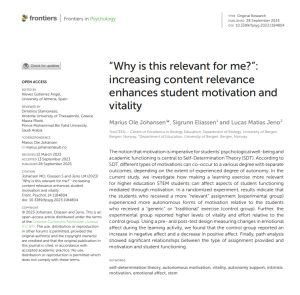New research article on course content relevance and student motivation
 A new study has been published by bioCEED members Marius Ole Johansen, Lucas M. Jeno, and Sigrunn Eliassen. In this experiment, students were either given a generic data set and instructions to work on, or a real-world data set and instructions. The students were asked to use the programming software R to calculate different statistical procedures. The results showed that student using real-world data set found using this more motivating and exhorted more effort compared to students using the generic data set. We believe this is because the real-world data set is more relevant and meaningful for the students. Finally, the students who used the generic data set, felt more negative and less positive following the experiment, compared to the students who used the real-world data set. The implication of this study is that using real-world cases that are meaningful and relevant for the students can be motivating because its more enjoyable and personally important for the students, and thus leading to more motivation, energy, and effort.
A new study has been published by bioCEED members Marius Ole Johansen, Lucas M. Jeno, and Sigrunn Eliassen. In this experiment, students were either given a generic data set and instructions to work on, or a real-world data set and instructions. The students were asked to use the programming software R to calculate different statistical procedures. The results showed that student using real-world data set found using this more motivating and exhorted more effort compared to students using the generic data set. We believe this is because the real-world data set is more relevant and meaningful for the students. Finally, the students who used the generic data set, felt more negative and less positive following the experiment, compared to the students who used the real-world data set. The implication of this study is that using real-world cases that are meaningful and relevant for the students can be motivating because its more enjoyable and personally important for the students, and thus leading to more motivation, energy, and effort.
The study can be read online, and the abstract is here:
The notion that motivation is imperative for students’ psychological well-being and academic functioning is central to Self-Determination Theory (SDT). According to SDT, different types of motivations can co-occur to a various degree with separate outcomes, depending on the extent of experienced degree of autonomy. In the current study, we investigate how making a learning exercise more relevant for higher education STEM students can affect aspects of student functioning mediated through motivation. In a randomized experiment, results indicate that the students who received a more “relevant” assignment (experimental group) experienced more autonomous forms of motivation relative to the students who received a “generic” or “traditional” exercise (control group). Further, the experimental group reported higher levels of vitality and effort relative to the control group. Using a pre- and post-test design measuring changes in emotional affect during the learning activity, we found that the control group reported an increase in negative affect and a decrease in positive affect. Finally, path analysis showed significant relationships between the type of assignment provided and motivation and student functioning.
Citation
Johansen MO, Eliassen S and Jeno LM (2023). “Why is this relevant for me?”: increasing content relevance enhances student motivation and vitality. Front. Psychol. 14:1184804. doi: 10.3389/fpsyg.2023.1184804


